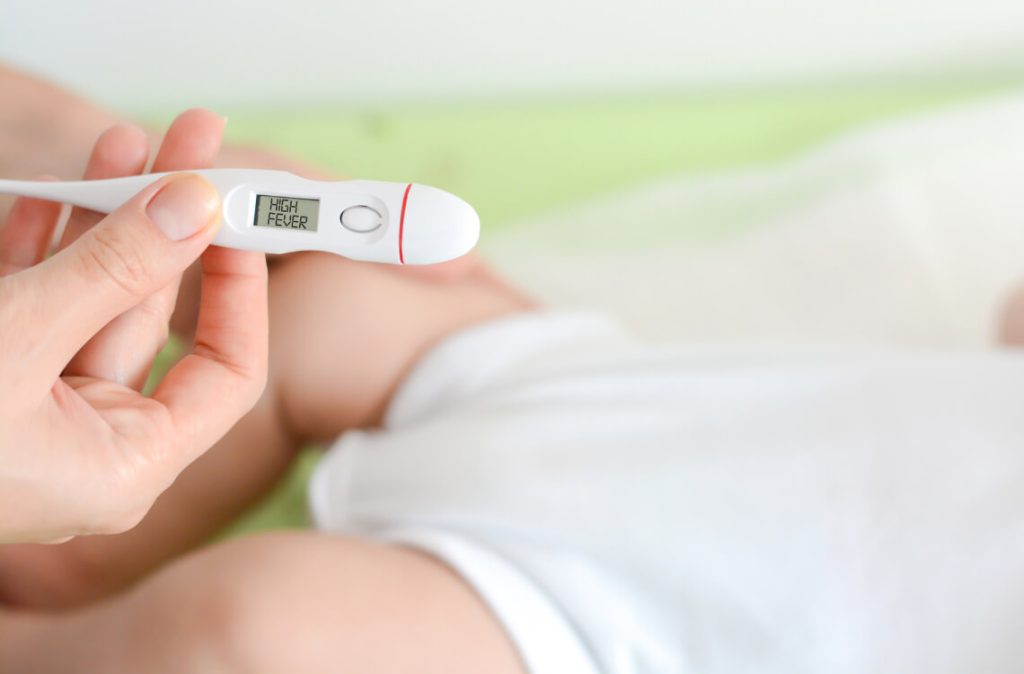Walking down the path of parenthood? Yes, it’s pleasant, but worries sure kick in when your baby falls sick (such as fever in baby).
Scroll down for ten easy steps to follow if your little one gets a fever.
The Dangers of Fever in Babies
Fever in babies is more than just a discomfort—it’s a signal that their body is fighting an invasive illness or infection.
The flu, a cold, or more serious conditions like meningitis can all trigger a high fever.
The seriousness of these illnesses can make fever in babies quite concerning.
Remember, a baby’s immune system is not as robust as an adult’s.
This reality makes them more susceptible to complications, especially if their body temperature increases rapidly or reaches an extreme level.
In extreme cases, high fevers can cause febrile seizures, which, although usually harmless, can be quite frightening for parents to witness.
Unfortunately, fevers can also lead to dehydration more quickly in babies than in older children or adults.
Losing essential fluids can further weaken a baby’s already strained system, leading to additional problems such as heat stroke, fatigue, or, in severe instances, organ failure.
Additionally, the discomfort caused by fever can also affect a baby’s appetite or ability to sleep.
Adequate nutrition and rest are crucial components of recovery.
A lack of nutrients and sleep can hinder the healing process, prolong the illness, and subject the baby to undue stress.
Therefore, swift measures to control a baby’s fever under the guidance of healthcare professionals, is key to ensure their speedy recovery and well-being.
It’s also essential to identify the underlying cause of the fever to mitigate risks and ensure a comprehensive course of treatment.
Tip 1: Document the Fever
Has your baby, under 12 months, got a fever? Start by noting their temperatures.
Do this every few hours for 24 hours. This action step helps.
You’re recording exact temperatures, the time taken, and symptoms.
All these details are incredibly helpful. Healthcare professionals briefly assess the situation accurately.
Tip 2: Stay Hydrated
Babies can quickly get dehydrated due to fever. It results to a dry mouth.
To avoid this, encourage fluid intake. It could be water, juices, or an oral rehydration solution.
In addition, keep breastfeeding or give them their regular milk feed.
Tip 3: Watch for Other Signs
Always monitor your baby. Look out for discomfort signs.
For instance, ear pain hints to an ear infection. Ear infections often come with high fever.
If you spot any signs, promptly call a healthcare provider. Their advice is vital.
Tip 4: Ensure Comfort
Comfort matters during fever. How do you ensure this? Dress the baby in light clothing.
Keep an eye on the room temperature, too. A very hot or cold room worsens the baby’s discomfort.
Tip 5: Use Medication Wisely
Yes, some over-the-counter meds reduce fever. But be cautious.
Avoid aspirin completely in children.
Why? The risk of Reye syndrome.
It’s a rare, severe condition. It affects the brain and liver.
Tip 6: Check Temperature Regularly
A high fever can worry you. Understand that.
Remember, it’s the body’s way of fighting illness.
Keep checking the temperature regularly. When the high-temperature drops, it’s a hint.
The body is slowly defeating the illness.
Tip 7: Ensure Rest
Sleep and rest are cure accelerators.
Create a comfortable and quiet environment for the baby.
It fastens the recovery process.
Tip 8: Serve Balanced Diet
Maybe your child’s appetite shrank due to fever.
Encourage them to eat, though. Nutrient-rich foods and a balanced diet are essential.
They fasten recovery and resupply lost nutrients.
Tip 9: Seeking Medical Help As Needed
Medical professionals play vital roles. If the fever lasts over 24 hours, seek help. If your child seems very uncomfortable or unwell, call for help. Their well-being should always come first.
Tip 10: Trust Your Parental Instincts
Lastly, don’t underestimate your parental instincts. You know your child the best. Feel something is off? Seek medical advice promptly.
Conclusion
In conclusion, dealing with a fever in your baby can be an emotionally and physically challenging situation for everyone involved.
Thankfully, following practical and simple steps such as documenting the fever, maintaining hydration levels, taking the appropriate medicines, monitoring and ensuring comfort, providing an environment conducive to rest, offering a balanced diet, and observing for other symptoms can ameliorate the stress and pave the way for a speedy recovery.
Trusting our parental instincts plays a crucial role in handling fever situations, as parents know their children best and can quickly sense when something is not quite right.
It’s significant to remember that while these tips provide overall guidance, it is of the utmost importance to consult professional medical advice whenever you are uncertain or feel your child’s fever could be a symptom of a more serious health concern.
Consulting a paediatrician or a family doctor not only ensures receiving accurate advice geared toward your child’s specific case but also helps to alleviate worries and anxieties that can arise during such difficult times.
Parenthood is a journey filled with ups and downs, all of which we gladly undertake, owing to the love and affection we have for our children.
Don’t be afraid to seek help from healthcare professionals.
Their expertise will provide the best assistance possible in addressing your child’s fever, ensuring safety and comfort.
As we always remember, our children’s happiness and health dictate the alteration of our lives and championing through the difficult times only solidifies the beautiful bond we share with our little ones.
Disclaimer: The information provided in this article is for informational purposes only and should not be considered as medical advice from Motherhood. For any health-related concerns, it is advisable to consult with a qualified healthcare professional or medical practitioner.
For more insightful stories and fun recipes, stay tuned to Motherhood Story!
